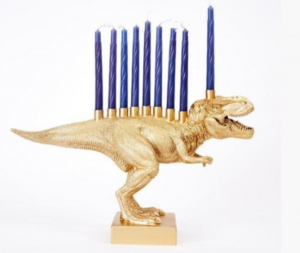Hanukkah: eight nights and eight lights, ma’oz tsur, chocolate money, dreydldreydldreydl. Latke parties and gaudy decoration. What’s not to love?
When it comes to the great miracle of light, people regularly miss the point. The rabbis made sure we did. The last drops of pure oil that was needed to rekindle the seven-branched candelabra at the temple in Jerusalem were barely enough for one day, but — a miracle! — it lasted for the eight days needed to prepare new the oil so it could once again burn in perpetuity. Nice. But a nes gadol? The parting of the sea was a nes gadol, but this? Really?
The lighting of the menorah, the songs, and the sweet jelly donuts cleverly distract us from asking too many questions, except, where’s the applesauce? This makes an interesting contrast to the biblical festival of Passover. When it comes to the Parting of the Sea, the rabbis encourage questions. The more you discuss the better. Why these laws and why those laws, where does this come from, how do we know that? Questions upon questions before you are even allowed to eat! Not on Hanukkah. Say a blessing, light the menorah, put it in the window, and eat a lot of greasy food. But don’t ask, what is this about?
Hanukkah is not a law of Moses from Sinai. The rabbis inherited the celebration of national heroism from the days of the Hasmonean priest-kings who ruled a resurgent Jewish commonwealth from about 142 until 63 BCE . The rabbis kept the festival of lights but they got rid of the Books of the Maccabees. Removed from the curriculum, just like that. Why?
Was it because the Hasmoneans combined kingship and priesthood? But they didn’t rule as kings over the Jews. Herod the Great was the first to do that, and his relationship with the Hasmoneans ended badly for the Hasmoneans. (“Off with their heads!”)
Was it because they were too Hellenistic themselves? True, the Books of the Maccabees came down to us in Greek, not Hebrew, and most of them were written in Greek, as propaganda literature for Greek-speaking Jews and Ptolemaic society in Alexandria, asserting that the Jews didn’t rebel for fun. The bad Seleucids made them do it because one of them (who also once threatened Alexandria) interfered with their ancestral laws. Jews don’t make revolution. They just, with G-d’s help, restore order. Very peaceful. In fact, three of the Books named for the Maccabees are not about the Maccabees at all, but they tell stories about the horrible tribulations that preceded the rise of those noble saviors of the fatherland, times during which the Jews proved to be not just courageous resisters but pious sufferers, martyrs for their ancestral laws. In other words, essentially peaceful and marvelously pious.
Why then didn’t the rabbis like them? For one, they adopted nothing written in Greek, which they regarded as alien wisdom. Maybe all the talk about immortal souls rubbed them the wrong way, too. What was on their minds was not immortality, but resurrection. Why not immortality? Simple. Since Ezekiel 37, resurrection meant national revival. To speak of the resurrection of the dead allowed the rabbis to pretend that their eschatology was purely individual and personal, whereas it may have been code for national revival, at a time when such could not be openly sought. After all, the rabbis were peaceful subjects of the Roman Empire.
Perhaps we can pull a Maimonides here. What if the true meaning and intention of rabbinic eschatological teaching was lost when people started taking the external form of expression of rabbinic teaching for its inner meaning? What if the meaning of a metaphor of a personal hereafter was a coded form of political hope? What if the fence around the Torah aimed to preserve the people as a nation at a time when other means of national self-assertion were unavailable?
The preservation of Hanukkah in its distorted, peaceful, and unheroic form kept the flame of the Maccabees alive. It would not be the only case in Jewish history where the lighting of candles at a particular time symbolized something different from what was openly acknowledged.


One Comment
trunnion ball valve posted on August 26, 2022 at 2:13 am
Hanukkah: hiding in plain sight | Michael Zank1661494408